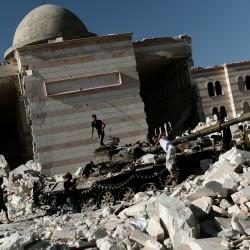BROOKE GLADSTONE: When Al Jazeera paid a reported $500 million dollars last week to buy the chronically under-watched Current TV, a US cable network partly owned by Al Gore, it was really buying itself potential placement in front of some 40 million pairs of American eyeballs each night. Whether that's a good deal remains to be seen, but it reaffirms the lengths, financial and otherwise, that Al Jazeera's primary funder, the government of Qatar, is willing to go to expand the network’s reach.
In its more than 16 years as a news network, Al Jazeera has angered nearly every government it's covered. But as it tries to introduce itself to American audiences as a credible news source, it’s also fighting accusations that its primary funder is dictating that coverage, especially, critics say, in its coverage of the last few years of uprisings in the Arab world.
BOB GARFIELD: That accusation is increasingly heard even within Al Jazeera. A number of longtime employees have quit in protest, including correspondents in Beirut, Cairo, Moscow, Paris and Berlin. When asked last year why he’d just quit, the Berlin correspondent Aktham Suliman said, quote, “We at Al Jazeera were always proud to say we’re financed by Qatar but the state never interferes with our reporting. Now we suddenly find ourselves in a situation in which our reporting is precisely aligned with Qatari foreign policy.” We reached out to Suliman for an interview but he politely declined because of his facility with English.
We did talk last August to Sultan Al Qassemi, a blogger and political commentator who expressed many of the same critiques of Al Jazeera and Al Arabiya, the second biggest Arab satellite news channel owned by members of the Saudi royal family. For a stark example, he says, look no further than Syria.
SULTAN AL QASSEMI: For instance, Al Jazeera and Al Arabiya would host individuals who would speak for 15, 20 minutes about events on the ground when they were not even in the country. Sometimes, even if they were in the country, they would be hundreds of miles away from the scene of events. The background of some of these activists is never investigated. The channels do not give disclaimers about them not being able to verify these videos or these claims. There have been reports for over a year now that there are elements of extreme Sunni Islamist groups that have been operating in Syria. However, these have never been reported in either of the channels. There is a pattern that we noticed with them being clearly sympathetic of the rebels.
I must say that I am personally sympathetic to anyone trying to bring down this evil regime, but that is not the job of a channel that I’m supposed to turn to for neutral news.
BOB GARFIELD: Maybe the most astonishing example of what you’ve just described is the appearance, I think on both channels, of the cleric, Adnan al-Aroor. He’s presented as a kind of disinterested voice on the subject, but has said the most incendiary things about the Assad regime and the Alawite minority that supports him.
SULTAN AL QASSEMI: And their clamor to host anyone who will criticize the brutal regime of Bashar al-Assad, the channels have gone to a, an unprecedented low by hosting a vile cleric who has said the most horrific things about a, a minority, a sect that is part and parcel of the community that is Syria, and he’s encouraging people to take revenge on them.
BOB GARFIELD: To, quote, “Mince them in meat grinders and feed their flesh to the dogs.”
SULTAN AL QASSEMI: Amongst other things.
BOB GARFIELD: At Al Jazeera the guy running the Syrian Desk is the brother of a leader in the Syrian National Council, which sounds innocuous enough but it happens to be the Muslim Brotherhood in Syria.
SULTAN AL QASSEMI: They go by different last names in order to hide this affiliation. This also builds into a very strong relationship between Al Jazeera and the Muslim Brotherhood organization, not only in Syria but also in Egypt and elsewhere.
BOB GARFIELD: Now, to be clear here, finding fault with a pro-rebel slant at Al Jazeera or Al Arabiya does not equal defending the Bashar al-Assad regime.
SULTAN AL QASSEMI: This regime is evil. It has caused the deaths of 20,000 people, at least. My sympathies lie with the people who want to see the end of this regime. However, I refuse to be told a story that is, in one way or the other, curated for the benefit of one party or the other.
BOB GARFIELD: Sultan, thank you so much.
SULTAN AL QASSEMI: Thank you very much.
BOB GARFIELD: Political Commentator Sultan Al Qassemi wrote about Syria coverage on foreignpolicy.com.
We contacted Al Jazeera for comment, and it responded, quote, “Al Jazeera’s coverage of the Arab awakening has been acclaimed, award-winning, and appreciated by viewers the world over. All the uprisings from Tunisia and Egypt through to Syria have been approached with the same principles and vigor. However, each time conspiracy theorists have levied the same simultaneous accusations of lack of coverage or exaggeration. This is due to our Arabic channel’s importance as the most watched news outlet in the Arab world.
[MUSIC UP AND UNDER]
We cover Syria, as many international channels do, and it can’t be that they are all doing so at the behest of the Qatar government. You have to deal with the facts on the ground, and that’s what we always do in our reporting.”

